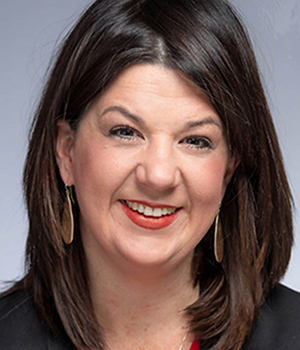LEO's Heather Reynolds to testify on Capitol Hill, share anti-poverty research
Heather Reynolds, the Michael L. Smith Managing Director of the University of Notre Dame's Wilson Sheehan Lab for Economic Opportunities (LEO), will testify before the House Ways and Means Subcommittee on Work and Welfare on Wednesday, March 29. The hearing, “Welfare is Broken: Restoring Work Requirements to Lift Americans Out of Poverty,” begins at 2 p.m. and will be livestreamed via webcast here.
This hearing, which will be hosted by House Committee on Ways and Means Chairman Rep. Jason Smith and Work and Welfare Subcommittee Chairman Rep. Darin LaHood, will focus on the Temporary Assistance for Needy Families (TANF) program, including the program’s structure and effectiveness in lifting families out of poverty.

Reynolds was invited as an expert on poverty to speak from her experience in both the service provider and research spaces. LEO works with service providers across the country to build rigorous evidence for programs designed to move people permanently out of poverty. Prior to joining LEO, for 14 years, Reynolds was CEO of Catholic Charities Fort Worth, where she saw firsthand the disconnect that often exists between policy and on-the-ground work.
During her testimony, Reynolds will discuss the need for research-informed policy decisions by citing several LEO studies that demonstrate that the most effective way to help Americans with low incomes out of poverty is through pairing flexible financial assistance and case management. One example is Padua — a holistic case management program designed by Catholic Charities Fort Worth to address the unique assortment of barriers faced by families in poverty. LEO recently completed a randomized, controlled trial on Padua that showed its clients were 25% more likely to be employed. And unemployed individuals who were offered Padua services earned 46% more, were 60% more likely to be stably housed 24 months later, and experienced a sharp decline in credit card debt that persists over time.
Reynolds will give examples of other programs with similar success, including the Bridges to Success program of Rochester, New York. It provides its residents with low incomes with economic mobility mentors who can help them coordinate community support services and move out of poverty one critical life issue at a time. Results from that study showed that participants, when compared to a control group, were more likely to be employed, with that trend continuing over time.
Reynolds’ testimony will emphasize how critical it is for policymakers to use evidence when making decisions about not only TANF, but anti-poverty programs across the board.
“At LEO, we have more than 90 research projects building evidence to help us understand what works,” Reynolds said. “We take the most creative leaders in this space and design research studies, studying the impact of their services. It is hard enough to run a social service agency and then add on top of that a research study. These organizations do it because they believe if they can understand their impact, it can be used to scale and replicate their work. Many of our provider partners serve TANF recipients who work and poor families who work but do not qualify for TANF. To get people to move out of poverty (whether that includes TANF or not), we need evidence-based programs that work.”
Contact: Tracy DeStazio, assistant director of media relations, 574-631-9958 or tdestazi@nd.edu
Originally published by at news.nd.edu on March 28, 2023.
Latest Research
- University of Notre Dame and IBM Research build tools for AI governanceMain Building (Photo by Matt Cashore/University of Notre Dame) …
- Smarter tools for policymakers: Notre Dame researchers target urban carbon emissions, building by buildingCarbon emissions continue to increase at record levels, fueling climate instability and worsening air quality conditions for billions in cities worldwide. Yet despite global commitments to carbon neutrality, urban policymakers still struggle to implement effective mitigation strategies at the city scale. Now, researchers at Notre Dame’s School of Architecture, the College of Engineering and the Lucy Family Institute for Data & Society are working to reduce carbon emissions through advanced simulations and a novel artificial intelligence-driven tool, EcoSphere.
- Seven engineering faculty named collegiate professorsSeven faculty members in the Notre Dame College of Engineering have been named collegiate professors—a prestigious title awarded by the university and college in recognition of excellence in research, teaching and service. The designation may be conferred on faculty at the assistant, associate or…
- ‘A special challenge’: German studies scholar wins National Humanities Center fellowship for research on medieval womenFor CJ Jones, the joy of research is not the answers but the journey. And the next step on that journey is a fellowship with the National Humanities Center. …
- Notre Dame Lead Innovation Team partners with local WIC program to identify, prevent lead poisoning in childrenB.A.B.E. store “shoppers” now have something new to help their families: free lead screening kits offered by the University of Notre Dame’s Lead Innovation Team.
- Notre Dame Welcomes Ninth Cohort of Warrior-Scholars for Transformative Academic JourneyNOTRE DAME, IN – The University of Notre Dame recently concluded its ninth successful Warrior-Scholar Project (WSP) boot camp, hosting 34 dedicated Warrior-Scholars from June 21st to 28th. This intensive, week-long academic residency provided transitioning service members and veterans…













